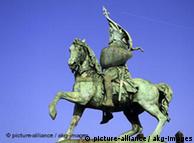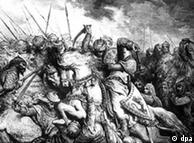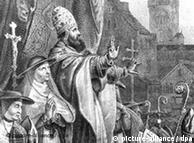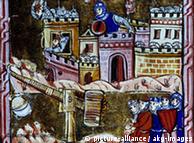HISTORY | 16.11.2009 God wills it: the first crusade 1097 - 1099 At the Council of Clermont, Pope Urban II launched the first crusade The Middle E
HISTORY | 16.11.2009
God wills it: the first crusade 1097 - 1099
In 1071, a Christian army was defeated by Muslim troops in Manzikert, eastern Anatolia. But it was the news from the Holy City that awakened the wrath of the pope. After all, there were reports of honorable Christians being subjected to unbearable harassment during their pilgrimages. For Pope Urban II (ca. 1035 - 1099), the Council of Clermont in November 1095 was the perfect moment to call for an "armed pilgrimage" to Jerusalem. The Holy Father's choice of words left no doubt as to his intentions:
"They circumcise the Christians, and the blood of the circumcision they either spread upon the altars or pour into the vases of the baptismal font. When they wish to torture people by a base death, they perforate their navels, and dragging forth the extremity of the intestines, bind it to a stake; then with flogging they lead the victim around until the viscera, having gushed forth, the victim falls prostrate upon the ground (…) Let the holy sepulchre of the Lord our Savior, which is possessed by unclean nations, especially incite you, and the holy places which are now treated with ignominy and irreverently polluted with their filthiness."
Massacre in the name of the Lord
It was an exaggeration, to say the least. Reports that Muslim rulers were charging a kind of entrance fee for Jerusalem were, however, correct. For the Christian pilgrims, this was an intolerable situation that was exacerbated by the destruction of holy sites, statues and monuments. The first crusade aimed to put things right.
In 1096, around 300,000 European knights set out, also with a view to capturing valuable booty. Pope Urban II offered the Christian warriors further incentive by promising absolution for all earthly sins. But that did not protect the knights with the cross on their shields from suffering high casualties, even before they'd reached Jerusalem. Time and again, they were attacked by partisans or local gangs. By the beginning of July 1098, the crusaders had taken Nicaea and Antioch. They continued via Beirut to Jaffa and Haifa. In Edessa, Godfrey of Bouillon (1060 - 1100) established the first "crusader state." Three years after they set off, the crusaders reached Jerusalem.
In July 1099, some 21,000 exhausted knights began the siege of the Holy City. The used battering rams and catapults to destroy the city walls. Then, with the cry "God wills it" on their lips, they stormed Jerusalem and embarked on a massacre that only a few residents survived. The crusaders portrayed the massacre as a way of "cleansing" the city of non-believers, and held a procession of thanks once it was over. Some 70,000 people lost their lives that day.
 Sculpture of Godfrey of BouillonCrusader states
Sculpture of Godfrey of BouillonCrusader states
In the summer of 1099, Godfrey of Bouillon was named "Defender of the Holy Sepulchre." In addition to Edessa, further crusader states were established: Armenia Minor, Antioch, Tripoli, and of course, Jerusalem.
But this new order in the Middle East didn't last very long, as the region was surrounded by powerful Arab states which looked upon the crusaders with anger and disgust: the Emirate of Damascus, the Caliphate of Cairo, and the Seljuk Sultanate. Over the two centuries that followed, they were determined to win back the territory that had been taken, prompting six further crusades which lasted until the mid-13th century and cost hundreds of thousands of lives.
 The crusades were a bloody business
The crusades were a bloody business
In Europe, however, the crusades were an expression of the Christian community which had gathered around the cross, under the leadership of the pope. A kind of Christian "European community" emerged, and the "Universitas Christiana" unified Europe over a long period of time. But the Europeans' feeling of togetherness was based on the rejection of those of different faiths. It wasn't about identifying "with" something, rather "against" something.
Author: Matthias von Hellfeld (dc)
Editor: Andreas Illmer


Comments